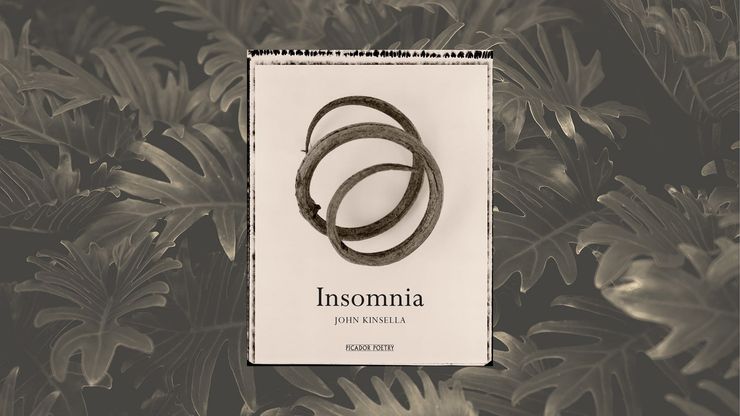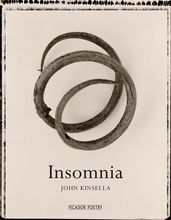‘The Bulldozer Poem’: An Introduction to Insomnia
Insomnia, from award-winning poet John Kinsella, is a vivid and urgent address of the crisis of being gripping our planet. In this exclusive video, John Kinsella introduces this collection and reads one of his stirring environmental poems.

A poem from John Kinsella’s urgent poetry collection Insomnia, ‘The Bulldozer Poem’ is a protest against the destruction of our natural world. Watch Kinsella introduce the book in our video below.
‘Hi, I’m going to read a poem from my new book of poetry, Insomnia, a book that is largely concerned with the relationship between community, the self, and the world around it and us . . . how we take our responsibilities into an active space. . . For me poetry and activism are inseparable. So, I write a poem to live in the world, I don’t write a poem to live only in a book.
‘I take the so-called art of writing a poem very seriously. . . . But in the end, it is the poem in the activist space, standing in front of the bulldozers, speaking out in public spaces against tyranny and oppression, caring for an animal under threat from human rapacity, working against greed and rapacity in all its forms – these are the things that matter to me as a poet. For any of you who know my work, I’m very attuned to the natural world – I care passionately about it and it’s a big part of my connection with existence, with being. So when I see, as I do every day of my life almost, trees being felled and bush being cleared, how the bloody-mindedness, greed, lack of understanding and these kind of empty values – it gets to me not only intellectually but viscerally, in my body. I shake and get upset. So I go and speak, and I try and stop this happening.
‘So, the poem I’m going to read was written during the Roe 8 Highway Protest in Perth, Western Australia, where a rapacious government and industry wanted to destroy the Beeliar wetlands, to put a largely pointless highway through a very very rare and delicate environmental area in Perth city. . .This is the bulldozer poem . . . it is an address to bulldozers and to the self. It plays with literary conventions, but in the end, it is a conversation against the consuming of everything, the damaging and eating of the biosphere.’
'The Bulldozer Poem'
Bulldozers rend flesh. Bulldozers make devils
of good people. Bulldozers are compelled to do
as they are told. Bulldozers grimace when they
tear the earth’s skin – from earth they came.
Bulldozers are made by people who also want new
mobile phones to play games on, and to feed families.
Bulldozers are observant of phenomena – decisions
are taken out of their hands. They are full of perceptions.
They will hear our please and struggle against their masters.
Bulldozers slice & dice, bulldozers tenderise, bulldozers
reshape the sandpit, make grrrriiing noises, kids’ motorskills.
Bulldozers slice the snake in half so it chases its own tail,
writing in front of its face. Bulldozers are vigorous
percussionists, sounding the snap and boom of hollows
caving in, feathers of the cockatoos a whisper in the roar.
Bulldozers deny the existence of Aether, though they know
deep down in their pistons, deep in their levers, that all
is spheres and heavens and voices of ancestors worry
at their peace. Bulldozers recognise final causes, and embrace
outcomes that put them out of work. There’s always more
scrub to delete, surely . . . surely? O continuous tracked tractor,
O S and U blades, each to his orders, his skillset. Communal
as D9 Dozers (whose buckets uplift to asteroids waiting
to be quarried). O bulldozer! your history! O those Holt tractors
working the paddocks, O the first slow tanks crushing
the battlefield. The interconnectedness of Being. Philosopher!
O your Makers – Cummings and Caterpillar – O great Cat
we grew up in their thrall whether we knew it or not – playing
sports where the woodlands grew, where you rode in after
the great trees had been removed. You innovate and flatten.
We must knew your worldliness – working with companies
to make a world of endless horizons. It’s a team effort, excoriating
an eco-system. Not even you can tackle an old-growth tall tree alone.
But we know your power, your pedigree, your sheer bloody
mindedness. Sorry, forgive us, we should keep this civil, O dozer!
In you is a cosmology – we have yelled the names of bandicoots
and possums, of kangaroos and echidnas, of honeyeaters
and the day-sleeping tawny frogmouth you kill in its silence.
And now we stand before you, supplicant and yet resistant,
asking you to hear us over your war-cry, over your work
ethic being played for all it’s worth. Hear us, hear me –
don’t laugh at our bathos, take us seriously, forgive
our inarticulateness, our scrabbling for words as you crush
us, the world as we know it, the hands that fed you, that made you.
Listen not to those officials who have taken advantage
of their position, who have turned their offices to hate
the world and smile, kissing the tiny hands of babies
that you can barely hear as your engines roar with power.
But you don’t see the exquisite colour of the world, bulldozer –
green is your irritant. We understand, bulldozer, we do –
it is fear that compels you, rippling through eternity,
embracing the inorganics of modernity.
‘ . . . This poem is written in acknowledgement of Noongar elders of the region I come from, people whose land it is and whose land has been stolen. This is an anti-colonial poem, as all the poems are in my work, and all the poems are in Insomnia. The book itself of course . . . and you can judge from the title, I suffer from insomnia as I have all my life and at times it’s been terrible – two hours a night sleeping, two or three hours a night, which I’m back to at the moment. But what I do with my time is I try and work towards some type of environmental activism in poetry and so on, that actually has physical meaning, that’s not just an idea. Whether I succeed or not is another thing. In this poem, the human body and insomnia, – and how we react and respond to the world – are all entangled with obligation, response to the pressure around us from obviously climate change, human induced climate change, extinction. These things we are on the verge of constantly and are actually happening. So this book is an environmental book merged with the personal and viscerally the physical of the self. Anyway, I hope it is of use to someone, and it is there to use in resistance.’
Insomnia
by John Kinsella
John Kinsella's vivid new collection addresses the crisis of being currently afflicting us, full of poems of self-accusation, angry protest, loss and trauma, and celebrations of the natural world. Insomnia could be John Kinsella's most powerful collection yet.



